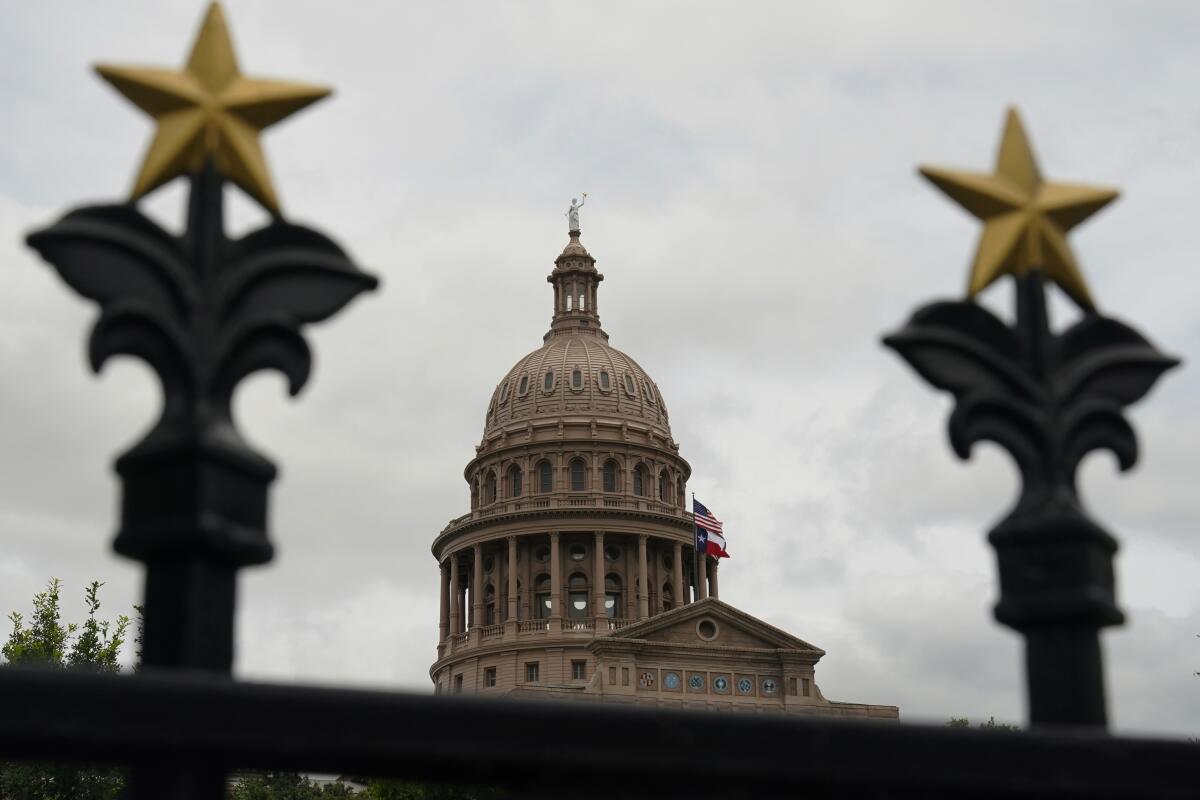Gavin Newsom is threatening to end-run California voters. It reflects a terrible trend

- Share via
- Lawmakers around the country are substituting their judgment for the will of voters.
- Newsom has suggesed taking back the power Californians gave themselves over redistricting.
In 2010, California voters drove the foxes from the henhouse, seeing to it that lawmakers in Washington and Sacramento would no longer have the power to draw congressional districts to suit themselves.
It wasn’t close.
Proposition 20 passed by a lopsided 61%-to-38% margin, giving congressional line-drawing authority to an independent mapmaking commission and thus ending decades of pro forma elections by injecting much-needed competition into California’s House races.
Now, Gov. Gavin Newsom is talking about undoing voters’ handiwork.
Newsom said he may seek to cancel the commission, tear up the boundaries it drew and let Democratic partisans draft a new set of lines ahead of next year’s midterm election — all to push back on President Trump and Texas Republicans, who are attempting a raw power grab to enhance the GOP’s standing in 2026.
The threatened move is a long shot and, more than anything, a ploy to boost Newsom’s White House ambitions.
It’s also highly presumptuous on his part, reflecting an increased arrogance among lawmakers around the country who are saying to voters, in effect, “Thank you for your input. Now go away.”
If Texas gerrymanders its House seats to boost Republicans, Newsom threatens to do the same for Democrats. But it’s not in the governor’s power after voters created a nonpartisan commission.
Take what just happened in Missouri. Last year, 58% of voters approved a ballot measure increasing the state minimum wage and requiring employers to provide paid sick leave. This month, Republican Gov. Mike Kehoe signed legislation that limited the minimum wage increase and scrapped the sick leave requirement altogether.
In two other states, Alaska and Nebraska, lawmakers similarly tried but failed to, respectively, overturn voter-passed measures on paid sick leave and a hike in the minimum wage.
“It’s a damning indictment of representative democracy when elected officials are scared of the will of their own voters,” said Alexis Magnan-Callaway of the Fairness Project, a union-backed advocacy group that focuses on state ballot measures.
It is indeed.
But it’s part of a pattern in recent years of lawmakers, mainly in Republican-led states, undercutting or working to roll back voter-designed measures to enshrine abortion rights, expand Medicare and raise the minimum wage.
To be clear, those measures were passed by voters of all stripes: Democrats, Republicans, independents.
“People are transcending party lines to vote for issues that they know will impact their communities,” said Chris Melody Fields Figueredo, executive director of the Ballot Initiative Strategy Center, a progressive organization. By ignoring or working to nullify the result, she said, lawmakers are helping contribute “to what we’re seeing across the country, where people are losing faith in our institutions and in government.”
And why wouldn’t they, if politicians pay no mind save to ask for their vote come election time?
In a direct attack on the initiative process, at least nine state legislatures passed or considered laws in their most recent session making it harder — and perhaps even impossible — for citizens to place measures on the ballot and seek a popular vote.
There can be issues with direct democracy, as Sean Morales-Doyle of the Brennan Center for Justice pointed out.
“There can be times when systems can be abused to confuse voters,” he said, “or where voters do things without maybe fully understanding what it is they’re doing, because of the way ballot measures are drafted or ballot summaries are offered.”
But it’s one thing to address those glitches, Morales-Doyle said, and “another thing to just basically say that we, as the representatives of voters, disagree with what voters think the best policy is and so we’re going to make it harder for them to enact the policy that they desire.”
In Texas, Republicans are wielding their lopsided power in hopes of erasing as many as five Democratic-leaning congressional seats, boosting the GOP’s chances of keeping control of the House in the 2026 midterm election. Trump, staring at the prospect of an emboldened, subpoena-wielding Democratic House majority, is backing the effort whole-hog.
That, Newsom said, is the fighting-fire-with-fire reason to tear up California’s congressional map and gerrymander the state for Democrats just as egregiously as Texas Republicans hope to do. “We can sit on the sidelines, talk about the way the world should be. Or, we can recognize the existential nature that is this moment,” the governor asserted.
It’s awfully hard to argue against corralling the errant Trump and his Republican enablers. Still, that’s no reason to ignore the express will of California voters when it comes to reining in their own lawmakers.
Taking Newsom’s gerrymander threat at face value, there are two ways he could possibly override Proposition 20.
He could break the law and win passage of legislation drawing new congressional districts, face an inevitable lawsuit and hope to win a favorable ruling from the California Supreme Court. Or he could call a costly special election and ask voters to reverse themselves and eliminate the state’s nonpartisan redistricting commission, at least for the time being.
Combining an ancient trope with modern cynicism, the sex-trafficking scandal has ingredients that keep it fresh long after other conspiracies faded. President Trump used it for political gain.
It’s a hard sell. One presumes Newsom’s message to Californians would not be: “Let’s spend hundreds of millions of your tax dollars so you can surrender your power and return it to politicians working their will in the backrooms of Washington and Sacramento.”
But that’s the gist of what they would be asked to do, which bespeaks no small amount of hubris on Newsom’s part.
If elections are going to matter — especially at a time our democracy is teetering so — politicians have to accept the results, whether they like them or not.
Otherwise, what’s the point of having elections?
More to Read
Insights
L.A. Times Insights delivers AI-generated analysis on Voices content to offer all points of view. Insights does not appear on any news articles.
Viewpoint
Perspectives
The following AI-generated content is powered by Perplexity. The Los Angeles Times editorial staff does not create or edit the content.
Ideas expressed in the piece
The author argues that Governor Gavin Newsom’s threat to dismantle California’s independent redistricting commission disregards the will of voters who established it to combat gerrymandering. This reflects a broader trend of politicians undermining voter-approved reforms nationwide. Key points include:
- California voters decisively passed Proposition 20 (2010) to transfer congressional redistricting power from self-interested legislators to an independent commission, ending decades of noncompetitive elections[1][2].
- Newsom’s proposal to overturn this commission—motivated by countering Texas Republicans’ partisan gerrymandering—echoes actions in states like Missouri, where lawmakers nullified voter-backed measures on minimum wage and sick leave[2].
- Such maneuvers erode public trust in democratic institutions, as elected officials increasingly ignore or override ballot initiatives passed by bipartisan voter coalitions[1].
Different views on the topic
Critics of the independent commission and supporters of Newsom’s stance highlight concerns about structural flaws and political pragmatism:
- Political opponents have historically resisted redistricting reforms, as seen when California’s congressional delegation raised $10 million to defeat a 2005 redistricting initiative, arguing that elected representatives better understand local nuances than appointed commissions[1].
- Newsom’s 2023 veto of a bill expanding independent redistricting to counties suggests skepticism toward the model’s universal applicability, emphasizing flexibility in governance during “existential” threats like partisan power grabs[2][3].
- Legal challenges, such as Connerly v. California, questioned the commission’s selection process as potentially exclusionary, though courts upheld its constitutionality[3].
Get the latest from Mark Z. Barabak
Focusing on politics out West, from the Golden Gate to the U.S. Capitol.
You may occasionally receive promotional content from the Los Angeles Times.













